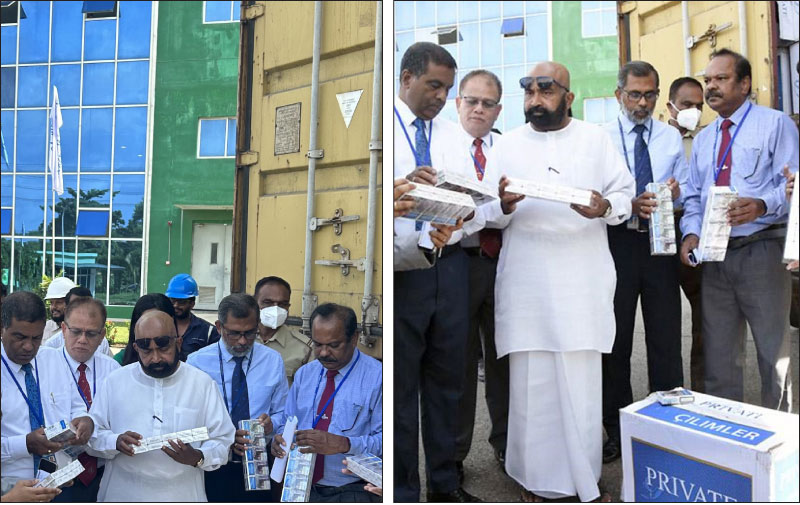Tuesday Apr 22, 2025
Tuesday Apr 22, 2025
Friday, 6 October 2023 00:20 - - {{hitsCtrl.values.hits}}

|
By Ajith Perera
Sri Lanka must work harder to safeguard its revenue sources with adequate policy and action to combat smuggling. Contraband items of various products are retailed openly across all parts of the country, and the authorities show little concern for the revenue lost. Smuggling is often a result of poor pricing, inadequate enforcement and market policy. Despite an educated upwardly mobile population, Sri Lanka’s retail offering is among the poorest in the world because it cannot balance pricing policy, as successive governments scurry with deficit-financing in the wake of spiraling recurrent expenditure.
|
Sri Lanka, hotspot for smugglers
Sri Lanka being a hotspot for smugglers became further evident over the past three months, as Customs and the police made multiple detections of contraband cigarettes smuggled into the country. Last month, within a span of a fortnight, over Rs. 6.2 million illegal cigarettes were confiscated at the international airport, a trend seen throughout the months preceding this. Recently, the authorities also destroyed 204 million counterfeit cigarettes worth over Rs. 15 billion. Had these cigarettes made their way into the market, the estimated loss to the Government would have been over Rs. 13 billion.
Smuggling is nothing new to Sri Lanka. People are well aware that foreign cigarettes and tobacco products are not allowed into the country, but they continue to traffic the products due to the allure of ghastly profits and a grossly lax system of detection and penalties. This is commonplace for almost all other products reaching Sri Lanka. Tobacco at least derives some degree of attention as it is a significant source of revenue for the Government. The World Health Organization reports that one in every ten cigarettes consumed in the world today is illicit. In Sri Lanka, as per the research published, that figure jumps to three in every ten cigarettes. Over the past decade, Sri Lanka has become a preferred destination for smugglers as unsustainable taxation and resultant pricing drove consumers underground, with cigarette prices jumping well over 125% within a short span of five years. The Government must pay more attention to right-sizing its pricing and policy mix.
Contraband is by no means a simple discussion. Its roots run deep into financing international terrorism, human trafficking, gun-running, narcotics and much more. The war in Ukraine has also fanned the flames of illicit cigarettes, with some countries recording growth in smuggling by 19%, as per Euronews. In the European Union alone, cigarette smuggling causes a loss of over 10 billion Euros annually. Furthermore, smoking contraband is probably worse than smoking itself. Euronews reports evidence of hay and asbestos involved in the manufacture of illicit cigarettes. Accordingly, the health costs of smuggling are equally concerning to the revenue mix.
Govt. action needed to curb smuggled goods The Middle East, India and China are the prime sources of smuggled tobacco and other products into Sri Lanka. The UAE’s Jebel Ali free trade zone churns out over $5 billion in cigarettes annually, with much of the produce destined to be smuggled and sold illegally without tax. The intelligence exists, and authorities do act, at times. A considerable share of smuggled cigarettes still reaches the Sri Lankan market, and customs estimates for 2019 posted the figure to be over 750 million sticks annually. Accordingly, Sri Lanka loses Rs. 50 billion in revenue annually due to cigarette smuggling. The Government and its agencies must act immediately to curb this rot, and it entails close introspection of people and processes that potentially aid and abet such movements. For instance, the IMF observed last week with regard to the Department of Customs, “there is virtually no culture of integrity at every level.”
Progressive and representative taxation, pragmatic policy and an astute system of justice and policing are cornerstones for economic and social development that will make the citizenry and their stakeholders willing and respectful participants on that journey of growth. Sri Lanka’s problem is that far too often it chooses to intensify pressure on critical aspects to cover its sins on hopeless fronts. It must turn the tide.
(The writer is a retired maritime security expert having served in Sri Lanka and the Middle East.)
Discover Kapruka, the leading online shopping platform in Sri Lanka, where you can conveniently send Gifts and Flowers to your loved ones for any event including Valentine ’s Day. Explore a wide range of popular Shopping Categories on Kapruka, including Toys, Groceries, Electronics, Birthday Cakes, Fruits, Chocolates, Flower Bouquets, Clothing, Watches, Lingerie, Gift Sets and Jewellery. Also if you’re interested in selling with Kapruka, Partner Central by Kapruka is the best solution to start with. Moreover, through Kapruka Global Shop, you can also enjoy the convenience of purchasing products from renowned platforms like Amazon and eBay and have them delivered to Sri Lanka.
Discover Kapruka, the leading online shopping platform in Sri Lanka, where you can conveniently send Gifts and Flowers to your loved ones for any event including Valentine ’s Day. Explore a wide range of popular Shopping Categories on Kapruka, including Toys, Groceries, Electronics, Birthday Cakes, Fruits, Chocolates, Flower Bouquets, Clothing, Watches, Lingerie, Gift Sets and Jewellery. Also if you’re interested in selling with Kapruka, Partner Central by Kapruka is the best solution to start with. Moreover, through Kapruka Global Shop, you can also enjoy the convenience of purchasing products from renowned platforms like Amazon and eBay and have them delivered to Sri Lanka.